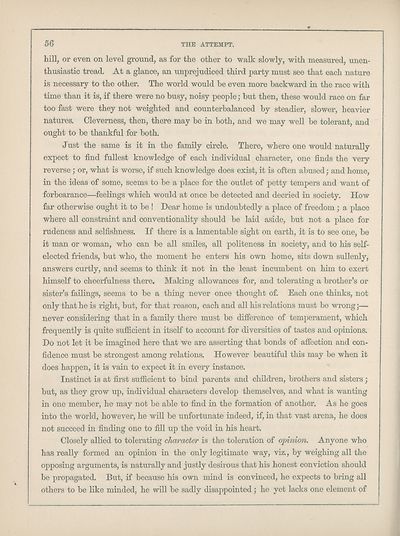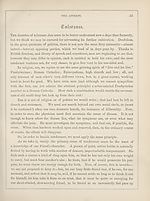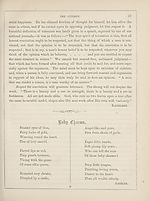Download files
Complete book:
Individual page:
Thumbnail gallery: Grid view | List view

56 THE ATTEMPT.
hill, or even on level ground, as for the other to walk slowly, with measured, unen-
thusiastic tread. At a glance, an unprejudiced third party must see that each nature
is necessary to the other. The world would be even more backward in the race with
time than it is, if there were no busy, noisy people; but then, these would race on far
too fast were they not weighted and counterbalanced by steadier, slower, heavier
natures. Cleverness, then, there may be in both, and we may well be tolerant, and
ought to be thankful for both.
Just the same is it in the family circle. There, where one would naturally
expect to find fullest knowledge of each individual character, one finds the very
reverse; or, what is worse, if such knowledge does exist, it is often abused; and home,
in the ideas of some, seems to be a i^lace for the outlet of petty tempers and want of
forbearance—feelings which would at once be detected and decried in society. How
far otherwise ought it to be ! Dear home is undoubtedly a place of freedom; a place
where all constraint and conventionality should be laid aside, but not a place for
rudeness and selfishness. If there is a lamentable sight on earth, it is to see one, be
it man or woman, who can be all smiles, all politeness in society, and to his self-
elected friends, but who, the moment he enters his own home, sits down sullenly,
answers curtly, and seems to think it not in the least incumbent on him to exert
himself to cheerfulness there. Making allowances for, and tolerating a brother's or
sister's failings, seems to be a thing never once thought of. Each one thinks, not
only that he is right, but, for that reason, each and all his relations must bo wrong;—
never considering that in a family there must be difi'erence of temperament, which
frequently is quite sufficient in itself to account for diversities of tastes and opinions.
Do not let it be imagined here that we are asserting that bonds of afiection and con¬
fidence must be strongest among relations. However beautiful this may be when it
does happen, it is vain to expect it in every instance.
Instinct is at first sufficient to bind parents and children, brothers and sisters;
but, as they grow up, individual characters develop themselves, and what is wanting
in one member, he may not be able to find in the formation of another. As he goes
into the world, however, he will be unfortunate indeed, if, in that vast arena, he does
not succeed in finding one to fill up the void in his heart.
Closely allied to tolerating character is the toleration of opinion. Anyone who
has really formed an opinion in the only legitimate way, viz., by weighing all the
opposing arguments, is naturally and justly desirous that his honest conviction should
be propagated. But, if because his own mind is convinced, he expects to bring all
others to be like minded, he will be sadly disappointed; he yet lacks one element of
hill, or even on level ground, as for the other to walk slowly, with measured, unen-
thusiastic tread. At a glance, an unprejudiced third party must see that each nature
is necessary to the other. The world would be even more backward in the race with
time than it is, if there were no busy, noisy people; but then, these would race on far
too fast were they not weighted and counterbalanced by steadier, slower, heavier
natures. Cleverness, then, there may be in both, and we may well be tolerant, and
ought to be thankful for both.
Just the same is it in the family circle. There, where one would naturally
expect to find fullest knowledge of each individual character, one finds the very
reverse; or, what is worse, if such knowledge does exist, it is often abused; and home,
in the ideas of some, seems to be a i^lace for the outlet of petty tempers and want of
forbearance—feelings which would at once be detected and decried in society. How
far otherwise ought it to be ! Dear home is undoubtedly a place of freedom; a place
where all constraint and conventionality should be laid aside, but not a place for
rudeness and selfishness. If there is a lamentable sight on earth, it is to see one, be
it man or woman, who can be all smiles, all politeness in society, and to his self-
elected friends, but who, the moment he enters his own home, sits down sullenly,
answers curtly, and seems to think it not in the least incumbent on him to exert
himself to cheerfulness there. Making allowances for, and tolerating a brother's or
sister's failings, seems to be a thing never once thought of. Each one thinks, not
only that he is right, but, for that reason, each and all his relations must bo wrong;—
never considering that in a family there must be difi'erence of temperament, which
frequently is quite sufficient in itself to account for diversities of tastes and opinions.
Do not let it be imagined here that we are asserting that bonds of afiection and con¬
fidence must be strongest among relations. However beautiful this may be when it
does happen, it is vain to expect it in every instance.
Instinct is at first sufficient to bind parents and children, brothers and sisters;
but, as they grow up, individual characters develop themselves, and what is wanting
in one member, he may not be able to find in the formation of another. As he goes
into the world, however, he will be unfortunate indeed, if, in that vast arena, he does
not succeed in finding one to fill up the void in his heart.
Closely allied to tolerating character is the toleration of opinion. Anyone who
has really formed an opinion in the only legitimate way, viz., by weighing all the
opposing arguments, is naturally and justly desirous that his honest conviction should
be propagated. But, if because his own mind is convinced, he expects to bring all
others to be like minded, he will be sadly disappointed; he yet lacks one element of
Set display mode to: Large image | Transcription
Images and transcriptions on this page, including medium image downloads, may be used under the Creative Commons Attribution 4.0 International Licence unless otherwise stated. ![]()
| Ladies' Edinburgh Debating Society publications > Attempt > Volume 3 > (70) Page 56 |
|---|
| Permanent URL | https://digital.nls.uk/104344072 |
|---|
| Attribution and copyright: |
|
|---|

